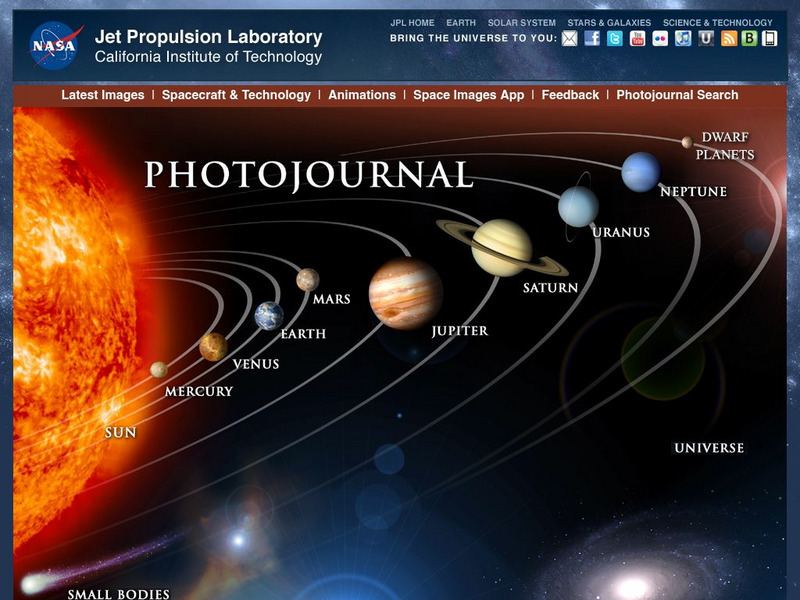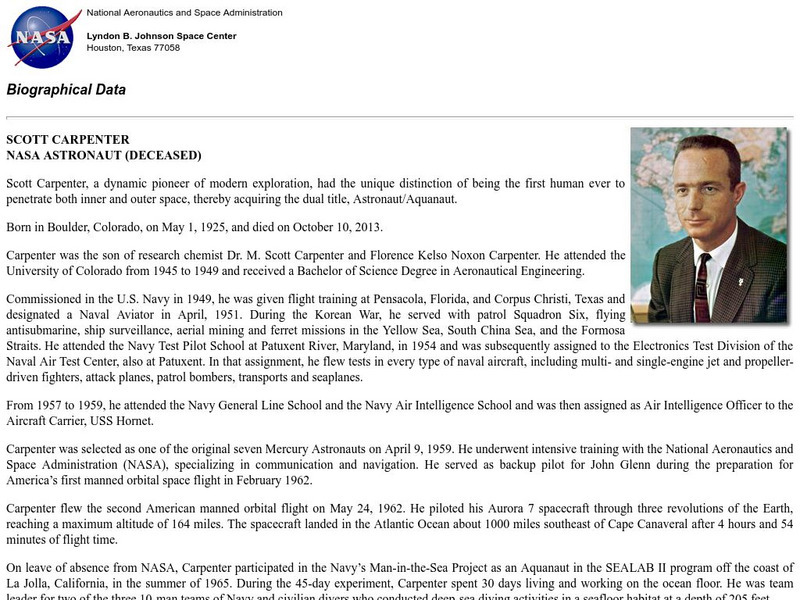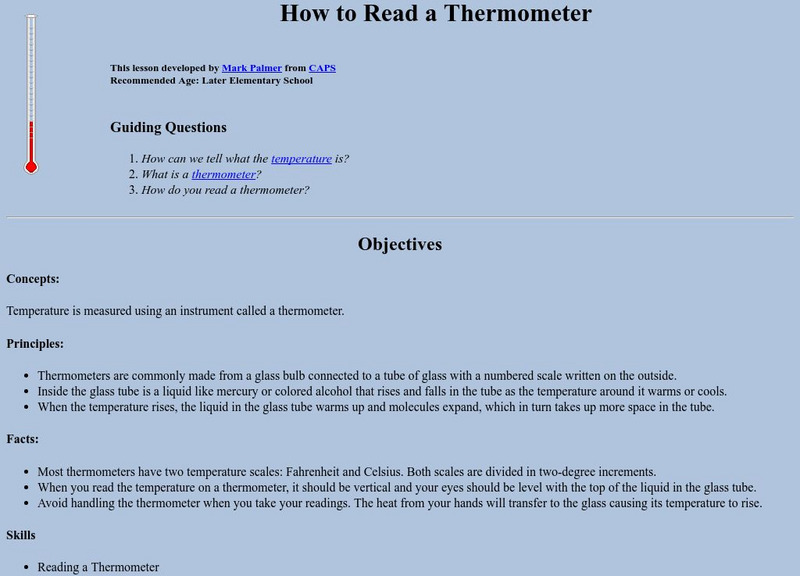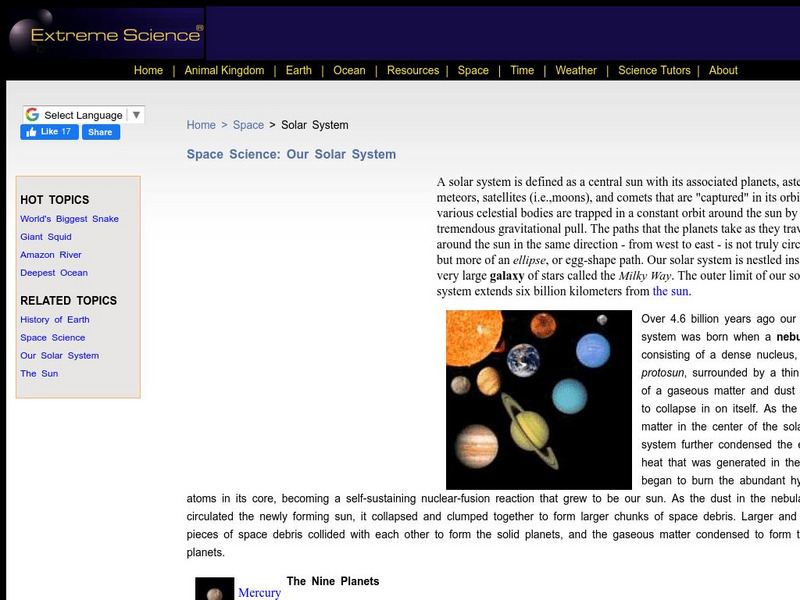Hi, what do you want to do?
Other
The Apollo Society: The Solar System
Contains a small set of images of solar system objects and a series of links to information about all solar system objects. Solar System Tours link to excellent image collections.
NASA
Nasa: Planetary Photojournal
This NASA site provides access to publicly released images from various Solar System exploration programs.
NASA
Nasa: Planetary Data Sytem: Welcome to the Planets
Collection of images, with vocalized explanatory captions, of the planets acquired by NASA as part of its exploratory space programs.
CNN
Cnn: Alan Shepard Was a "Pretty Cool Customer" July 22,1998
Biography and obituary of Alan B. Shepard. He was America's first space traveler. This site has links to related sites about Shepard and the early days of the space program.
NASA
Nasa: Astronaut Biography: Scott Carpenter
The numerous accomplishments of astronaut/aquanaut Scott Carpenter are discussed in this biography. The biography details his work with NASA and the U.S. Navy and discusses his life after retirement.
Science Buddies
Science Buddies: How Big Are the Planets in Our Solar System?
This activity explores the relative size of the eight planets that circle around the Sun.
Other
Canal Kids: Ciencias (Science for Portuguese Speakers)
Colorful, engagingly written information about astronomy and biology for Portuguese-speaking English language learners. Both subjects are broken down into a broad array of related subtopics. The biology section is particularly helpful...
Chateau Meddybemps
Medord Clock and Barometer: Barometers
A brief history of the development of barometer is given. Pictures of historical types of barometers are shown. Links to related topics.
Wikimedia
Wikipedia: John Glenn
An open-source encyclopedic site containing the biography of astronaut John Glenn discusses his many accomplishments and contributions to the space program.
Michigan Reach Out
Michigan Reach Out!: How to Read a Thermometer
Basic lesson provided for by "Michigan Reach Out!" for students learning to read a thermometer.
Treehut
Suzy's World: How Does a Thermometer Work?
This site from Suzy's World and Suzy Cato explores what a thermometer is and how it works. Content includes some fun facts, an experiment, and a classroom activity.
PBS
Pbs Nova: Historic Space Suits
It sounds odd to think of some space suits as actually being historic! But we've been traveling in outer space for quite sometime and space suits were bound to change. Here is an interactive on the different aspects of space travel garb...
Encyclopedia Britannica
Encyclopedia Britannica: Quincy Jones
Brief biography of Quincy Jones, noted musician.
Mocomi & Anibrain Digital Technologies
Mocomi: John Herschel Glenn Jr Biography
Interesting biographical information, fun facts, and famous quotes about John Glenn, the first American to orbit the earth.
Curated OER
Exploratorium: Your Weight on Other Worlds
Want to lose weight in a hurry? Just step on a scale on almost any other planet! This page allows you to enter your weight on Earth and it will calculate your weight on all of the other planets, some moons and even some stars. Requires a...
Curated OER
Solar Eclipse
A portal to resources on the sun, the Earth's neighboring planets, and the weather in space. Find out why Saturn is the "jewel of the Solar System" and explore what happens when Venus and Mercury make their rare transits across the sun.
Curated OER
Sunspots
A portal to resources on the sun, the Earth's neighboring planets, and the weather in space. Find out why Saturn is the "jewel of the Solar System" and explore what happens when Venus and Mercury make their rare transits across the sun.
Curated OER
Auroras
A portal to resources on the sun, the Earth's neighboring planets, and the weather in space. Find out why Saturn is the "jewel of the Solar System" and explore what happens when Venus and Mercury make their rare transits across the sun.
Curated OER
Nasa Logo
A portal to resources on the sun, the Earth's neighboring planets, and the weather in space. Find out why Saturn is the "jewel of the Solar System" and explore what happens when Venus and Mercury make their rare transits across the sun.
Curated OER
Wikipedia: National Historic Landmarks in Alabama: Redstone Test Stand
This steel frame structure was built in 1953 and is the oldest static firing facility at the Marshall Space Flight Center. It was important in the development of the Jupiter-C and Mercury/Redstone vehicles that launched the first U.S....
Curated OER
Educational Technology Clearinghouse: Clip Art Etc: Caduceus
The staff or mace carried by heralds and ambassadors in time of war. This name is also given to the staff with which Hermes or Mercury is usually represented, as is shown in he following figure of that god. From caduceus was formed the...
Curated OER
Educational Technology Clearinghouse: Clip Art Etc: Libra
A balance, a pair of scales. The principal parts of this instrument were: 1. The beam. 2. The two scales, called in Latin lances. The beam was made without a tongue, being held by a ring or other appendage, fixed in the centre. The...
Curated OER
Educational Technology Clearinghouse: Clip Art Etc: Marsupium
Marsupium, a purse. The purse used by the ancients was commonly a small leathern bag, and was often closed by being drawn together at the mouth. Mercury is commonly represented holding one in his hand, of which the annexed woodcut from...
Extreme Science
Extreme Science: Space Science: Our Solar System
Read about our solar system and its formation over 4.6 billion years ago. Find out about the planets, asteroids, meteors, satellites, and comets. More in-depth planet background can be accessed through links.
Other popular searches
- Planet Mercury
- Mercury Astronauts
- Project Mercury
- Mercury Emissions
- Mercury Picture
- Mercury Poisoning
- Mercury in Fish
- Mercury Disposal
- Mercury in Lakes
- Mercury Bioaccumulation
- Bioaccumulation of Mercury
- Model Habitat Mercury
















